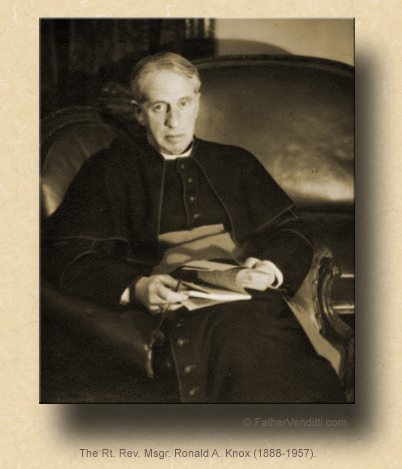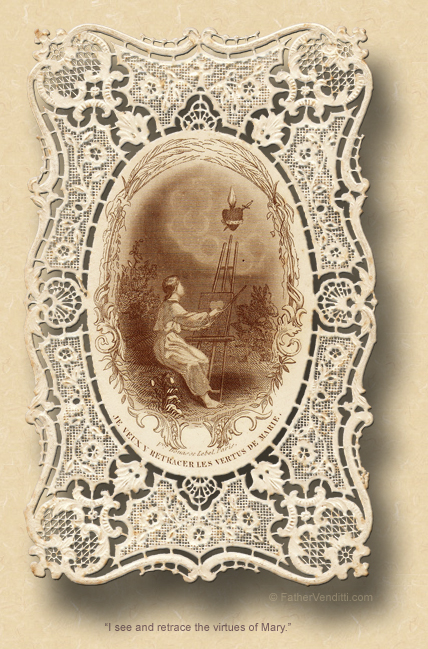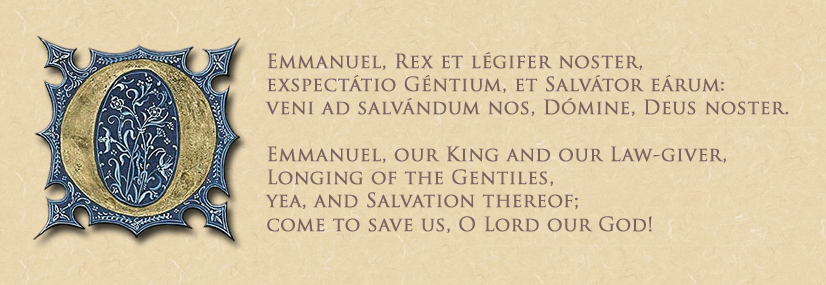Sometimes, You Just Have to Close Your Eyes and Jump.
The Eighth Day of the Greater Antiphons; and, the Fourth Sunday of Advent.*
Lessons from the secondary dominica, according to the ordinary form of the Roman Rite:
• II Samuel 7: 1-5, 8-12, 14, 16.
• Psalm 89: 2-5, 27, 29.
• Romans 16: 25-27.
• Luke 1: 26-38.
The Vigil Day of the Nativity of Our Lord.**
Lessons from the proper, according to the extraordinary form of the Roman Rite:
• Romans 1: 1-6.
• [Gradual] Exodus 16: 6-7.
• Matthew 1: 18-21.
FatherVenditti.com
|
7:53 AM 12/24/2017 —
There is one who is able to set your feet firmly in the path of that gospel which I preach, when I herald Jesus Christ; a gospel which reveals the mystery, hidden from us through countless ages, but now made plain, through what the prophets have written; now published, at the eternal God’s command, to all the nations, so as to win the homage of their faith. To him, to God who alone is wise, glory be given from age to age, through Jesus Christ, Amen (Rom. 16: 25-27 Knox).
 That’s today’s second lesson from Romans in Msgr. Knox’s translation. We began the season of Advent by quoting Father Knox, as I did the year before and the year before that, always with a promise to tell you something about him, but the promise always goes unfulfilled. So, since today’s Gospel lesson is a repeat from just a few days ago, and tomorrow is Christmas, I thought I would keep the promise. That’s today’s second lesson from Romans in Msgr. Knox’s translation. We began the season of Advent by quoting Father Knox, as I did the year before and the year before that, always with a promise to tell you something about him, but the promise always goes unfulfilled. So, since today’s Gospel lesson is a repeat from just a few days ago, and tomorrow is Christmas, I thought I would keep the promise.
Ronald A. Knox was born in 1888, the son of the Anglican Bishop of Manchester, and was a brilliant scholar from the start. At the tender age of twenty-four he became the Anglican chaplain of Oxford's Trinity College, but resigned in 1917 to enter the Catholic Church, and was quickly ordained to the Holy Priesthood. He returned to Oxford as a Catholic chaplain, but had to fend for himself, and supported himself by writing detective stories. In 1939 he was commissioned by the Catholic bishops of England and Wales to provide a new translation of the Bible into English to replace the antiquated Douay-Rheims Bible, which was completed in France in 1609 by expatriate English Catholics who had fled their country because of religious persecution; but, because the Douay-Rheims had become so ingrained in the minds of English speaking Catholics around the world for hundreds of years, there was a lot of resistance to the idea of a new translation, and Knox was forced out of Oxford and went into seclusion at the estate of two prominent Catholic converts, Lord and Lady Aston, where he finally completed the translation in 1948. The bishops of England and Wales were so pleased with it that they authorized its use in the Churches of Great Britain.
The Knox Bible has a lot of critics today, most of whom mistakenly claiming that he simply translated the Latin Vulgate, which isn’t true; he worked directly from the Greek and Hebrew originals, and no one knew Greek and Hebrew better than Knox. He made sense of passages from the Scriptures that even Saint Jerome had trouble with. Unfortunately, the bishops of the United States completed their own, vastly inferior revision of the Douay-Rheims Bible around the same time, and Knox's Bible never took hold in this country, and was out of print for a long time. Happily, it’s available again. As a Catholic priest he wrote a number of very important books about Protestantism and Catholicism, about language and the art of translation, a number of works of literary criticism, and was the first person after Arthur Conan Doyle to write his own Sherlock Holmes mystery. He died the year I was born.
Like Cardinal Newman before him, Knox was another of those Anglican intellectuals who lost a lot of friends when he entered the Catholic Church, and was always held in suspicion by cradle Catholics because he was never trained in a Catholic seminary. Most of us, I’m guessing, were born into the Church, so we don’t know what it’s like to be drawn away from everything we’ve known and loved all our lives. It really is a manifestation of that saying we use so many times but never really think about: making a “leap of faith.” Knox’s father, as I said, was an Anglican bishop, and Knox himself was groomed from childhood to assume a high position in the Church of England, and he threw it all away because God gave him the gift of seeing the Truth of the Catholic Faith. It is very much like leaping off of a cliff, not knowing how you’re going to land, but only knowing that it’s something you have to do.
His life does fit with today’s Gospel lesson, in spite of it being a repeat, and does become meaningful for us as we slug our way through the many vicissitudes of this earthly life and the choices that this life is constantly throwing at us. Like it was for our Blessed Mother, like it was for Father Knox, the circumstances of our lives are often not choices we make for ourselves, and we may very well doubt our ability to be faithful in the difficulties they present. But as our Lord said in Saint John, “It was not you that chose me, it was I that chose you” (John 15: 16 Knox); and, because He has chosen us, He will not abandon us.  We can pretend that He has, because we don't want to admit to our failures. But that's only because we forget that the gift of Sufficient Grace, about which we've been thinking so much during this season, is not a guarantee that our lives will be problem free. Our Lord said that himself: “If any man has a mind to come my way, let him renounce self, and take up his cross daily, and follow me” (Luke 9: 23 Knox). We can pretend that He has, because we don't want to admit to our failures. But that's only because we forget that the gift of Sufficient Grace, about which we've been thinking so much during this season, is not a guarantee that our lives will be problem free. Our Lord said that himself: “If any man has a mind to come my way, let him renounce self, and take up his cross daily, and follow me” (Luke 9: 23 Knox).
Now, those words may not sound particularly pleasant to us, but what Gabriel said to Mary at Her Annunciation, our Blessed Lord has also said to each one of us: He said it to me on the day I was ordained, He said it to many of you on the day you were married, He said it to each one of us on the day of our baptism: “Be not afraid.” If you go to a web site that searches Bible verses for you, and there are a few out there, and type in that phrase, you'll get hundreds of citations; I don't think there's a phrase that occurs more often throughout both the Old and New Testaments than “Be not afraid.” That one simple sentence, spoken by God through all eternity, sums up the entire Gospel on the subject of grace.
But so often we are afraid. We’re afraid of obligation. We’re afraid of sacrifice. And to overcome this fear we have to accept what we so often don't want to accept, especially when things are not going well: that God has not abandoned us. We must respond as Mary did: “…let it be unto me according to thy word.” Saying that did not mean that Mary understood it all, and I think it is unreasonable to assume that She did, for She did not have clairvoyance. What She did have was faith. Faith enough to say, " I will not be afraid." Just as we must say every single day: I will not be afraid of following the Lord. I will not be afraid of responsibility and obligation. I will not be afraid of living with a sudden and unexpected loss. I will not be afraid of marriage. I will not be afraid of the priesthood. I will not be afraid of the Gospel. I will not be afraid of the cross. I will not be afraid of things not going my way. I will not be afraid of doing what is right, no matter what the consequences. I will not be afraid of life.
Of all the passages of Holy Writ presented to us this time of year, there’s one I keep reading over and over again that doesn’t appear in the Missal during Advent or Christmas. It’s from Saint Matthew:
And Jesus checked him with a word, and the devil came out of him; and from that hour the boy was cured. Afterwards, when they were alone, the disciples came to Jesus and asked, Why was it that we could not cast it out? Jesus said to them, Because you had no faith. I promise you, if you have faith, though it be but like a grain of mustard seed, you have only to say to this mountain, Remove from this place to that, and it will remove; nothing will be impossible to you (Matt. 17: 17-19 Knox).

* Cf. the first footnote attached to the post here for an explanation of the Days of the Greater Antiphons.
** In the extraordinary form, the Vigil Day of Christmas is a first class feast of our Lord, and displaces the Fourth Sunday of Advent. Again, cf. the link referenced directly above for an explanation of how the concept of a vigil differs between the two forms.
|

